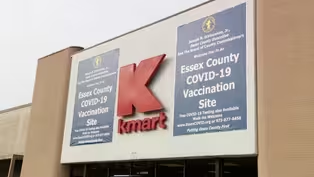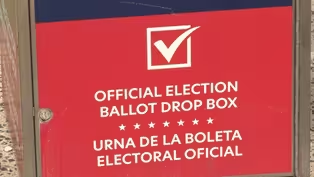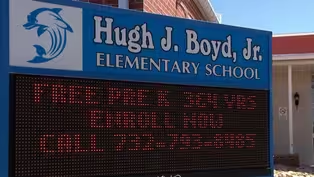NJ Spotlight News
The Change Project: NJ’s literacy issues
Clip: 4/16/2024 | 5m 2sVideo has Closed Captions
There’s debate about the different methods teachers use to teach kids how to read
NJ Spotlight News has launched The Change Project, an ongoing, multi-media series that takes a deep look at some of the state’s most pervasive social and economic challenges — and at some possible remedies. Education and child welfare writer Hannah Gross reported on declining literacy rates and solutions for NJ students and spoke with NJ Spotlight News anchor Briana Vannozzi about what she found.
Problems playing video? | Closed Captioning Feedback
Problems playing video? | Closed Captioning Feedback
NJ Spotlight News is a local public television program presented by THIRTEEN PBS
NJ Spotlight News
The Change Project: NJ’s literacy issues
Clip: 4/16/2024 | 5m 2sVideo has Closed Captions
NJ Spotlight News has launched The Change Project, an ongoing, multi-media series that takes a deep look at some of the state’s most pervasive social and economic challenges — and at some possible remedies. Education and child welfare writer Hannah Gross reported on declining literacy rates and solutions for NJ students and spoke with NJ Spotlight News anchor Briana Vannozzi about what she found.
Problems playing video? | Closed Captioning Feedback
How to Watch NJ Spotlight News
NJ Spotlight News is available to stream on pbs.org and the free PBS App, available on iPhone, Apple TV, Android TV, Android smartphones, Amazon Fire TV, Amazon Fire Tablet, Roku, Samsung Smart TV, and Vizio.
Providing Support for PBS.org
Learn Moreabout PBS online sponsorshipa significant number of New Jersey elementary school students aren't reading on grade level by the fourth grade Statewide data shows reading proficiency dropped during the pandemic and has yet to recover to 2019 levels in many school districts that's a key marker because it correlates with future academic and professional success and Governor Murphy this year announced a new focus on improving literacy rates through phonics-based reading strategies but is that the best method to teach students how to read in our fourth installment of the change project NJ Spotlight news looks at the strategies being used in and outside New Jersey education and child welfare writer Hannah Gross joins me on the set here to share what you found Hannah great to talk to you wow what a report I guess I need to ask first where do we stand where are our kids when it comes to literacy rates in New Jersey yeah so only about 42% of students in the third grade met or exceeded standards last year based on our state test which isn't great and that's been a pattern for many years now where only about at most 50% of students are meeting standards but if you do look at Nationwide scores New Jersey is still leading the nation which is not necessarily A positive when you're talking about rates at 42% so what are the strategies that have been used up until this point of course the remote learning uh caused a major setback for a lot of kids and the state has a lot of work to to do to fill that Gap but what are the strategies they've been using and what did you find is working yeah so New Jersey has about 600 school districts and the way literacy is taught can vary from one school district to another I think the most common approach for my reporting is balanced literacy which is a mix kind of of two different camps so on one Camp you have phonics and more explicit instruction where you're talking about sounding Out words and teaching kids directly how to read and then kind of a mix of whole language instruction which is focused more on making meaning thinking about context comprehension you might be using pictures or the rest of a sentence to figure out what a word means so Hannah when you talked to Educators and you actually went in and visited a couple of classrooms did they find that some approaches worked better than others yeah well it's not exactly about how they're being taught It's a combination of the two me methods so thinking about phonics based instruction phonics is important especially in grades kindergarten through second grade when kids need that explicit instruction but they also do need time to practice reading on their own and learning how to read so it's really a mix and those two tenants can be supported by things like teacher professional development having reading coaches to help teachers out in the classroom or reading specialist also screening students to understand their progress and if they might have a reading deficiency catching that early on is that happening right now the screening process it is happening in some school districts um including some of the ones that I visited but it's not required across the board right now what do we know about which students are either meeting or exceeding the levels of reading proficiency and which students aren't yeah so Asian students and white students have the highest rates of meeting Proficiency in the state and then black students and Hispanic students are low as well as students with disabilities English language Learners and economically disadvantaged students which is interesting because you cited an example in Mississippi with an um evidence-backed approach which has been successful in a state that's not necessarily known for having rates above New Jersey when it comes to academics and yet their students who were disadvantaged of marginalized communities were actually testing higher when it came to that yeah um Miss Mississippi is a more High poverty State than New Jersey and they spend less po per student on education than we do but they're economically disadvantaged students their English language Learners students with disabilities are actually scoring higher than those students in New Jersey on recent Nationwide tests so there are a lot of options because this whole project is about finding Solutions looking at what works so it sounds like you laid out a lot of options that Educators um are using and and can look at yeah yeah and some of the things that are happening in Mississippi and in other states are already happening here and people are interested in bringing them into their districts it's just a combination of what works for the districts what works for the community and what works for individual students Hannah gross for us and of course you can read her full project on our website Hannah thanks so much thanks Bri
Essex Co. COVID vaccine program faulted for lax oversight
Video has Closed Captions
Clip: 4/17/2024 | 4m 18s | The state watchdog cites 'significant deficiencies' in management of $40M in funding (4m 18s)
Menendez may blame wife in corruption trial — court filing
Video has Closed Captions
Clip: 4/17/2024 | 6m 55s | Interview: Brian Whisler, an attorney and former federal prosecutor (6m 55s)
New details of NJ’s World Cup contract
Video has Closed Captions
Clip: 4/17/2024 | 5m 15s | The contract includes tax breaks for FIFA, free public transport for ticket holders (5m 15s)
Ranked-choice voting could get first test in NJ
Video has Closed Captions
Clip: 4/17/2024 | 4m 36s | Jersey City and Hoboken have passed ordinances to ask the voters their preference (4m 36s)
Seaside Heights voters reject school-district merger
Video has Closed Captions
Clip: 4/17/2024 | 50s | Voters in Toms River Regional School District supported the proposed merger (50s)
Providing Support for PBS.org
Learn Moreabout PBS online sponsorship
- News and Public Affairs

Top journalists deliver compelling original analysis of the hour's headlines.

- News and Public Affairs

FRONTLINE is investigative journalism that questions, explains and changes our world.












Support for PBS provided by:
NJ Spotlight News is a local public television program presented by THIRTEEN PBS




